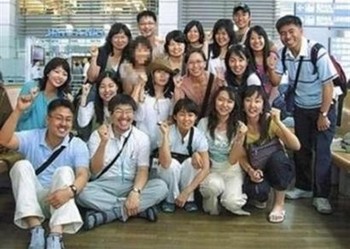Reuters, September 1, 2007
S.Korea Paid Taliban $20 Million Ransom to Release 19 Missionaries
Taliban: "With it we will purchase arms, get our communication network renewed and buy vehicles for carrying out more suicide attacks."
By Saeed Ali Achakzai
SPIN BOLDAK - South Korea paid Afghanistan's Taliban more than $20 million to release 19 missionaries they were holding hostage, a senior insurgent leader said on Saturday, vowing to use the funds to buy arms and mount suicide attacks.
But Seoul denies paying a ransom and there were signs of confusion among the Taliban when a spokesman also said no money had changed hands to secure the Koreans' freedom.
"We deny any payment for the release of South Korean hostages," an official at South Korea's presidential Blue House said on Saturday.
But the senior Taliban leader disagreed.

South Korean Christians posing for a group photograph before leaving for Afghanistan on July 13.
"We got more than $20 million dollars from them (the Seoul government)," the commander told Reuters on condition of anonymity. "With it we will purchase arms, get our communication network renewed and buy vehicles for carrying out more suicide attacks."
"The money will also address to some extent the financial difficulties we have had," he said, but did not elaborate.
The Taliban leader rejected an Afghan government statement that a senior Taliban leader, Mullah Brother, was killed in a U.S.-led operation on Thursday in the southern province of Helmand.
"This report is just propaganda," he said.
The commander is on the 10-man leadership council of the Islamist Taliban movement, which is led by the elusive Mullah Mohammad Omar and runs all of the insurgent group's affairs.
However Qari Mohammad Yousuf, a Taliban spokesman, later told Reuters no ransom was paid, saying it would discredit the group. There was no immediate explanation for the discrepancy.
The freed hostages flew out of Afghanistan on Friday to Dubai en route for South Korea.
If a ransom was paid, some say it will make Afghanistan more dangerous for foreign nationals who already curb movement for fear of abduction either by the Taliban or bandits. Some embassies and aid organisations impose curfews on foreign staff.
"If it has happened, for sure it puts us in a difficult situation as it will encourage other kidnappers to take foreign hostages," said one Afghan government official, asking not to be named.
The South Korean Christian volunteers, part of a group of 23 missionaries kidnapped in southeast Afghanistan in mid-July, arrived in Dubai on a chartered United Nations plane overnight and were due to fly on to Seoul on Saturday.
The Taliban killed two male hostages, while two women released earlier as a goodwill gesture have already flown home.
CONSTANT FEAR
Some of the freed hostages on Friday told of how they lived in constant fear for their lives and were split up into small groups and shuttled around the Afghan countryside to avoid detection.
One Taliban member would tend to a farm by day and then grab a rifle and stand guard over hostages at night.
The kidnapping was the largest in the resurgent Taliban campaign against foreign forces since U.S.-led troops ousted the Islamists from power in 2001.
The Taliban decided to free the hostages after Seoul agreed to pull all its nationals out of the central Asian country. They dropped their main demand that a group of prisoners held by the Afghan government be set free.
Seoul had already decided before the crisis to withdraw its 200 engineers and medical staff from Afghanistan by the end of 2008. Since the hostages were taken, it has banned its nationals from travelling there.
(Additional reporting by Sayed Salahuddin and Simon Gardner in KABUL and Lee Jin-joo in SEOUL)
Characters Count: 4420
